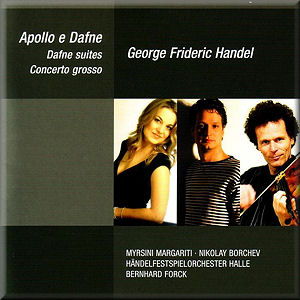 |
 |
|


alternatively
CD:
AmazonUK
AmazonUS
|
George Frideric
HANDEL (1685 - 1759)
Suite in B flat (HWV 352) [03:33]
Suite in G (HWV 353) [03:46]
Apollo e Dafne (HWV 122) [39:35]
Concerto grosso in a minor, op. 6,4 (HWV 322) [10:46]
 Myrsini Margariti (soprano), Nikolay Borchev (baritone)
Myrsini Margariti (soprano), Nikolay Borchev (baritone)
Händelfestspielorchester/Bernhard Forck
rec. September 2009, Paul-Gerhardt-Kirche, Leipzig, Germany. DDD
 AVI-MUSIC 8553200 [57:43]
AVI-MUSIC 8553200 [57:43] 
|
|
|
During his stay in Italy Handel contributed to some of the most
popular musical genres of his time. Among them was the cantata.
Thousands of such works were written in the decades around 1700.
The main composer in this genre was Alessandro Scarlatti. His
contributions, usually consisting of two pairs of recitatives
and arias, became the standard. Handel also composed a large
number of such cantatas.
Because of their subject matter and their theatrical character
the chamber cantatas - mostly scored for solo voice and basso
continuo - were close to opera. Quite apart from these there
were more elaborate compositions in which several voices were
supported by an orchestra. Even more than the chamber cantatas
such works can be considered pocket-size operas. Handel's cantata
Apollo e Dafne belongs to this category.
Handel probably started composing the cantata in Venice in 1709,
but completed it in Hanover in 1710, when he took up his job
as Kapellmeister to the Elector. The first performance
seems to have taken place in February 1711 in London, on the
occasion of the birthday of Queen Anne. She was enthusiastic
about Handel's cantata, and so was the court chronicler who
described it as "a fine consort, being a Dialogue in Italian,
in Her Majesty's Praise, set to excellent Musick by the famous
Mr. Hendel".
The cantata is for two soloists, representing Dafne (soprano)
and Apollo (bass) respectively, with an orchestra of transverse
flute, two oboes, bassoon, strings and basso continuo. The work
consists of the usual sequence of recitatives and arias, and
a couple of duets. In his operas Handel proves to be a master
of the musical depiction of characters. This cantata is an early
example of his skills in this department. Right from the start
Apollo shows his true colours by boasting about his power which
even Cupid can't surpass. That is a mistake as he falls in love
with Dafne the moment he sees her. She resists his advances,
but when he starts to stalk her she escapes by turning herself
into a laurel tree. In the closing aria Apollo resigns himself
to his fate: "Dear laurel, with my tears I shall water your
green leaves".
With Nikolay Borchev the role of Apollo is excellently cast.
He gives a perfect portrayal of the arrogance of Apollo, and
his performance is technically assured and stylistically convincing.
His diction and his performance of the coloraturas are impressive,
for instance in the aria 'Sprezza l'arco'. Myrsini Margariti
does equally well in her interpretation of the role of Dafne.
She has a nice voice which is perfectly suited to this role.
It is just a pity she sometimes uses a bit too much vibrato,
which is especially noticeable in the aria 'Felicissima quest'alma'.
The recitatives are taken with the right amount of rhythmic
freedom. In the dialogues the interaction between the two characters
is very good. That is also the case in the duet 'Deh! lascia
addolcire' in which the musical material for the two protagonists
is radically different, reflecting the antagonism between them.
The sudden shift from aria to recitativo accompagnato in 'Mie
piante correte', when Apollo discovers that Dafne has turned
into a tree, is realised in a truly theatrical manner, taking
the listener by surprise. There is just one defect in this performance:
some dacapos are a bit short on ornamentation.
Handel had already touched on the subject of this cantata when
he worked at the Hamburg opera. But his opera 'Die verwandelte
Daphne' has been lost, and it is assumed the two orchestral
suites HWV 352 and 353 contain instrumental music from this
opera. The Suite in B flat is performed here as a kind of overture,
as the cantata lacks one. That works pretty well, but the inclusion
of the other suite in the cantata itself, immediately before
the first entry of Dafne, is a less convincing decision. In
my view it interrupts the dramatic flow of the cantata.
These instrumental suites are beautifully played, though, and
so is the concerto grosso which concludes the disc. The orchestra
produces a nice sound of great transparency. The slow movements
of the concerto grosso are played with expression, and the rhythmic
pulse of the fast movements is perfectly explored. In the cantata
the orchestra underlines the drama, and the basso continuo section
deserves praise for pushing the performance forward. I don't
quite understand, though, why Apollo and Dafne each have their
own keyboard, the organ and the harpsichord respectively. The
use of an organ in this kind of repertoire is questionable anyway.
It is a shame that the booklet is not of the same standard as
the performance. According to the tracklist the duration of
this disc is 56:02, the reverse says it's 58:03 - both wrong.
In fact, most timings in the tracklist are completely wrong
as well. The first recitative is given as lasting 3:34, but
it is 00:48. According to the tracklist the last aria takes
2:28, but it lasts 5:37. And if that is not enough, the booklet
does not include the lyrics. This disc is produced in cooperation
with the Händel-Haus in Halle. I don't understand why this
institution accepts this kind of sloppiness.
Johan van Veen
|
|


 All Nimbus reviews
All Nimbus reviews















